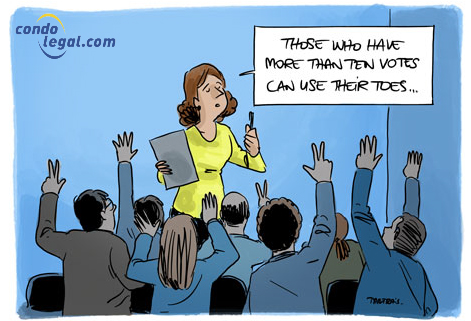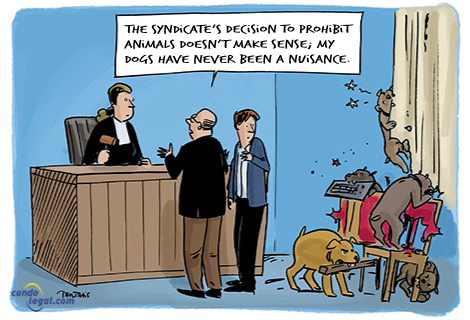Exercise and distribution of voting rights
 The first sentence of article 1090 of the Quebec civil Code states that "Each co-owner is entitled to a number of votes at a general meeting proportionate to the relative value of his fraction." The number of votes is related to the share of property rights each co-owner holds in the building. Therefore, the co-owner of a private portion whose relative value is higher will have more voting rights. In return, he or she will have to contribute to a larger portion of the costs related to the preservation of the immoveable and the maintenance and administration of the common portions, since common expenses are also distributed among all the co-owners according to the relative value of each portion.
The first sentence of article 1090 of the Quebec civil Code states that "Each co-owner is entitled to a number of votes at a general meeting proportionate to the relative value of his fraction." The number of votes is related to the share of property rights each co-owner holds in the building. Therefore, the co-owner of a private portion whose relative value is higher will have more voting rights. In return, he or she will have to contribute to a larger portion of the costs related to the preservation of the immoveable and the maintenance and administration of the common portions, since common expenses are also distributed among all the co-owners according to the relative value of each portion.
Number of votes of a co-owner
The owner of a unit is entitled, at any meeting of co-owners, to a certain number of votes established in proportion to the relative value of his fraction in relation to the value of all the fractions of the co-ownership. To know the number of votes he has, he must read the declaration of co-ownership (Constituting act of co-ownership). He can thus know the relative value and the number of votes allocated to him. It is usually expressed as a percentage (either in hundredths or thousandths). If the owner of two units (e.g., an apartment and a parking lot), he must add up the number of votes allocated to each of these two units. Thus, he will have a precise idea of the number of votes he holds at the meeting.
Joint owners
The Quebec civil Code has a special feature with regards to joint co-owners. When a private portion is owned by more than one person, the number of votes assigned to that fraction is divided between these joint owners. For example, if the relative value of the private portion is 6%, with two joint owners equally owning the fraction, each of them will be attributed 3% of all voting rights. Sometimes, the proportion between the joint owners is not equal. Therefore, it is important for the syndicate to obtain a copy of such act of acquisition, to attribute the proper percentage to each joint owner.
Article 1090 of the Quebec civil Code was amended by Bill 16, in December 2019, to add the following: « The co-owners of a fraction held in indivision who is absent from a general meeting is presumed to have mandated the other co-owners of that fraction to represent him, unless the absentee has, in writing, mandated a third person for that purpose or has indicated his refusal to be represented. The absentee’s voting rights are partitioned proportionately to the rights of the other co-owners in the indivision”.
Case of the usufructuary
An occupant of the building may have a right to enjoy an apartment without owning it and provided that it is preserved, i.e. maintained. It is another person who has the bare ownership. This may be the case for a widow, who has received by will from her deceased husband the right to use and enjoy an apartment (e.g. until her death), even though her children have inherited the property. In this case, we are talking about the dismemberment of the right to property.
The right to vote attached to a fraction of property held in co-ownership belongs to the usufructuary. However, the bare owner may exercise such voting rights when the object of the vote is modifying the substance of the property held in co-ownership, changing its destination or terminating the syndicate of co-owners. This allocation of voting rights is not opposable to the syndicate; it is to be discussed only between the usufructuary and the bare owner.
Case of the deceased co-owner
In the event of the death of a co-owner, the person acting on behalf of the estate must communicate to the syndicate of co-owners the documents authorizing him to act as agent at a meeting of co-owners. The liquidator, formerly called "executor", is the person authorized to represent the heirs of the deceased co-owner.
When the succession is settled, a declaration of transfer of immovable property is published in the land register by the liquidator in order to transfer to the legatee or heir the real estate rights in the fraction of co-ownership. The syndicate must be informed within 15 days. When this deed is published in the land register it is the new co-owner who exercises the voting rights
In addition, a proxy becomes null and void when the principal (the one who asks a third party to vote on his behalf) dies. Article 2175 of the Civil code of Quebec states the following: In addition to the causes of extinction common to obligations, the mandate is terminated by its revocation by the mandator, by renunciation by the mandatary, by the extinction of the power conferred on the mandatary or by the death of either of the parties.
Public policy clause
The method of distribution of votes is imperative. The president of a meeting of co-owners could not, for example, allocate to the co-owners a number of votes based on the number of residential units they hold in the co-ownership. Any decision that would tend to establish a system different from that provided for in article 1090 of the Civil Code of Quebec would be null and void. This article takes precedence over any contrary provision in the declaration of co-ownership, including the ones published before 1994. In other words, a vote count which would not be according to the relative value of the fractions is invalid (for example, a unit vote) and could therefore invalidate all the decisions taken by the assembly of co-owners. Referring to it would lead to an error in the calculation of votes and could, by the same token, invalidate decisions taken in assembly. That is why the president of the meeting, in such circumstances, should always refer to the relative value of the fractions to correctly establish the voting rights of each co-owner.
 WHAT YOU SHOULD KNOW! The voice of a co-owner is not necessarily worth another. The weight of the vote is measured according to the relative value of the fraction owned by the co-owner who takes part in the vote. The number of units he holds in the co-ownership increases the importance of his decision-making power in the meeting.
WHAT YOU SHOULD KNOW! The voice of a co-owner is not necessarily worth another. The weight of the vote is measured according to the relative value of the fraction owned by the co-owner who takes part in the vote. The number of units he holds in the co-ownership increases the importance of his decision-making power in the meeting.
 WHAT TO KEEP IN MIND: The Constituting act of the co-ownership (1st part of the declaration of co-ownership) includes a table that specifies the relative value and the share of the expenses and the number of votes attached to each fraction. The higher the relative value of a fraction, the greater the weight of the vote of the co-owner concerned
WHAT TO KEEP IN MIND: The Constituting act of the co-ownership (1st part of the declaration of co-ownership) includes a table that specifies the relative value and the share of the expenses and the number of votes attached to each fraction. The higher the relative value of a fraction, the greater the weight of the vote of the co-owner concerned
 WARNING! The “one person, one vote” principle does not apply in divided co-ownership. Each co-owner has a number of votes established by the declaration of co-ownership (in the “constitutive act of the co-ownership” section)
WARNING! The “one person, one vote” principle does not apply in divided co-ownership. Each co-owner has a number of votes established by the declaration of co-ownership (in the “constitutive act of the co-ownership” section)
Return to the super-factsheet ''Voting in a Meeting of co-owners''




